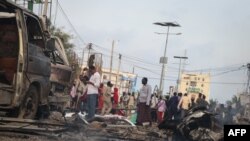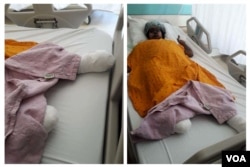Sadia Saleban was her family’s breadwinner. The 28-year-old Somali woman sold stuffed sambusa pastries to market-goers on the white sand-covered streets of Bakaraha, one of the busiest shopping centers in Mogadishu.
She and her husband, Ahmed Jima’le, were expecting a baby, and they lived with their children in Somalia’s conflict-scarred but resilient capital, on the Indian Ocean.
Year after year, suicide bombers and other militants launch brutal attacks on the residents of Mogadishu. Sometimes police stations or international offices become targets. Other times landmarks. Almost always, civilians are injured, killed or maimed.
Sometimes lengthy lulls follow the blasts. Other times they come in rapid succession, within weeks or days of one another. The Islamist terror group al-Shabab has taken responsibility for most of the attacks, even when bystanders die.
For more than a decade, al-Shabab has wreaked havoc in Somalia. Every day, residents hope for peace while bracing for the next attack.
Suddenly, a car bomb
On Nov. 9, Saleban was a passenger in a minibus as it drove past the Sahafi Hotel on KM4 Street, one of the city’s biggest roadways.
At that moment, a bomb ripped into the side of the minibus. Glass shattered. Metal warped.
Against odds, Saleban survived.
“The bus was full of people, but everyone else died except me,” Saleban told VOA’s Somali service.
Elsewhere in the city, Jima’le’s phone rang, and the caller broke the devastating news.
“I ran to the hospital when I heard she was injured. She had already lost one leg, which was left in the minibus,” Jima’le said. “Her right leg was badly injured, so the doctors ordered us to sign for an amputation.”
In the end, they removed Saleban’s leg below her knee.
Saleban’s mother, Mumino Nur Mohamed, heard about her daughter’s injuries when Amin Ambulance called from the hospital.
“The ambulance workers asked me, ‘Do you know Sadia Saleban?’ Knowing that she might be wounded or dead, I felt frightened and replied, ‘Yes, she is my daughter,’ and they said … ‘She is critically wounded,’” Mohamed said.
At least 65 people died and 106 others were wounded in the Nov. 9 attack, based on reports from the five hospitals that admitted victims. The tallies make the attack the deadliest in Mogadishu this year.
Grave consequences
For Saleban, the consequences extended beyond the double amputation. Her kidneys were badly hurt; her face burned by the flames of the explosion. Yet despite the severity of the injuries, her unborn baby survived the first night after the blast.
After each attack, families are left to pick up the pieces. Sitting beside Saleban’s bed in Erdogan Hospital, in Mogadishu, Jima’le wondered whether his wife would ever again be able to walk.
“She is recovering from the amputations, but still she cannot sleep, and every 10 minutes we put her on one side, as doctors ordered,” Jima’le said.
But Saleban’s ordeal wasn’t over.
“Having the nightmares of having both legs amputated, again doctors told us the baby is not moving, and has to be delivered,” Saleban’s mother said. “They put her on medications to accelerate her labor. Hours after, we were handed a dead baby boy.”
Mohamed says what happened to her daughter was tragic. But she is happy with what God had given to them.
“She came back from the market, where she sold the sambusa. She was going to her kids at home, when she encountered this tragedy.”
This story originated in VOA’s Somali service. Sahra Abdi Ahmed reported from Washington and translated the original Somali interviews to English. Salem Solomon wrote the story.





